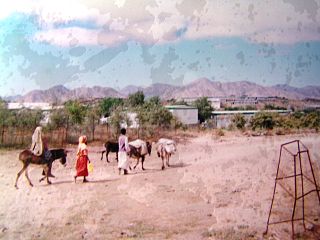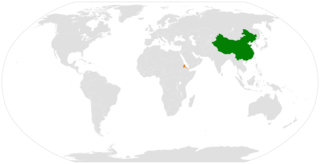
The economy of Eritrea has experienced considerable growth in recent years, indicated by an improvement in gross domestic product (GDP) in October 2012 of 7.5 percent over 2011. However, worker remittances from abroad are estimated to account for 32 percent of gross domestic product. Eritrea has an extensive amount of resources such as copper, gold, granite, marble, and potash. The Eritrean economy has undergone extreme changes due to the War of Independence.

Business is the activity of making one's living or making money by producing or buying and selling products. Simply put, it is "any activity or enterprise entered into for profit."

The Horn of Africa (HoA), also known as the Somali Peninsula, is a large peninsula of East Africa. Located on the easternmost part of the African mainland, it is the fourth largest peninsula in the world. It lies along the southern boundary of the Red Sea and extends hundreds of kilometres into the Guardafui Channel, Gulf of Aden, and Indian Ocean.

A ticker symbol or stock symbol is an abbreviation used to uniquely identify publicly traded shares of a particular stock on a particular stock market. In short, Ticker symbols are basically arrangements of symbols or characters representing specific assets or securities listed on a stock exchange or traded publicly. A stock symbol may consist of letters, numbers or a combination of both. "Ticker symbol" refers to the symbols that were printed on the ticker tape of a ticker tape machine.
Commercial law – body of law that governs business and commercial transactions. It is often considered to be a branch of civil law and deals with issues of both private law and public law. It is also called business law.

Isaias Afwerki is an Eritrean politician who has been president of Eritrea since shortly after he led the Eritrean People's Liberation Front (EPLF) to victory in May 1991, ending the 30-year-old war for independence from Ethiopia.

The People's Front for Democracy and Justice is the founding, ruling, and sole legal political party of the State of Eritrea. The successor to the left-wing nationalist Eritrean People's Liberation Front (EPLF), the PFDJ holds itself open to nationalists of any political affiliation. The leader of the PFDJ party and current President of Eritrea is Isaias Afwerki. It has been described as totalitarian.

A privately held company or private company is a company which does not offer or trade its company stock (shares) to the general public on the stock market exchanges, but rather the company's stock is offered, owned and traded or exchanged privately or over-the-counter. In the case of a close corporation, there are a relatively small number of shareholders or company members. Related terms are closely held corporation, unquoted company, and unlisted company.

The Eritrean–Ethiopian War was a conflict that took place between Ethiopia and Eritrea from May 1998 to June 2000, with the final peace only agreed to in 2018, twenty years after the initial confrontation. Eritrea and Ethiopia both spent considerable amount of their revenue and wealth on the armament ahead of the war and suffered reportedly 100,000 casualties combined as a direct consequence thereof, excluding indeterminate number of refugees. The conflict ultimately led to minor border changes through final binding border delimitation overseen by the Permanent Court of Arbitration.

Nakfa, Tigrinya: ናቕፋ, is a town in the Northern Red Sea region of Eritrea. It is also the name of a sub region of Eritrea.
The Afar, also known as the Danakil, Adali and Odali, are a Cushitic-speaking ethnic group inhabiting the Horn of Africa. They primarily live in the Afar Region of Ethiopia and in northern Djibouti, as well as the entire southern coast of Eritrea. The Afar speak the Afar language, which is part of the Cushitic branch of the Afroasiatic family. Afars are the only inhabitants of the Horn of Africa whose traditional territories border both the Red Sea and the Gulf of Aden.

The Eritrean War of Independence was a conflict fought between successive Ethiopian governments and Eritrean independence fighters from 1 September 1961 to 24 May 1991.

A company, abbreviated as co., is a legal entity representing an association of people, whether natural, legal or a mixture of both, with a specific objective. Company members share a common purpose and unite to achieve specific, declared goals. Companies take various forms, such as:
Articles related to Ethiopia include:
Articles related to Eritrea include:

Eritrea, officially the State of Eritrea, is a country in the Horn of Africa region of Eastern Africa, with its capital at Asmara. It is bordered by Ethiopia in the south, Sudan in the west, and Djibouti in the southeast. The northeastern and eastern parts of Eritrea have an extensive coastline along the Red Sea. The nation has a total area of approximately 117,600 km2 (45,406 sq mi), and includes the Dahlak Archipelago and several of the Hanish Islands.

Italian Eritrea was a colony of the Kingdom of Italy in the territory of present-day Eritrea. The first Italian establishment in the area was the purchase of Assab by the Rubattino Shipping Company in 1869, which came under government control in 1882. Occupation of Massawa in 1885 and the subsequent expansion of territory would gradually engulf the region and in 1889 borders with the Ethiopian Empire were defined in the Treaty of Wuchale. In 1890 the Colony of Eritrea was officially founded.

People's Republic of China–Ethiopia relations were established in 1970. Ethiopia has an embassy in Beijing and the People's Republic of China has an embassy in Addis Ababa. By 2016-2018, Chinese direct investment (FDI) in Ethiopia had reached US$4 billion and bilateral trade had grown to $5.4 billion.

Sino–Eritrea relations refers to the current and historical relationship between China and Eritrea. Eritrea gained independence from Ethiopia in 1993 and, as of 2007, relations between the two states registered "smooth growth".















